15 Best Substitutes for Asparagus
Are you tired of the same old asparagus in your recipes? I’ve got the lowdown on the best substitutes for asparagus that will add a burst of flavor to your dishes.
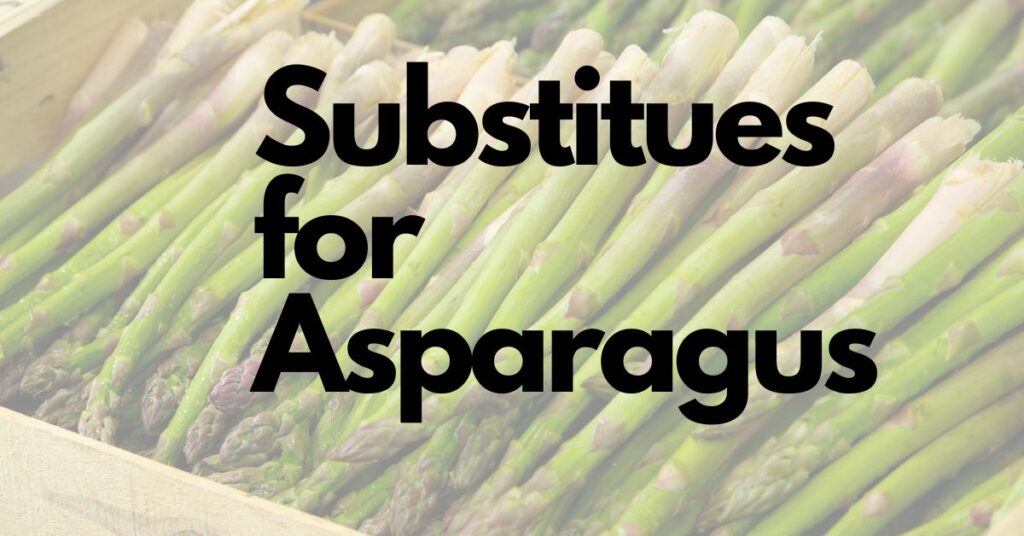
Asparagus happens to be one of my all-time favorite side dishes! I frequently serve it with my cedar-planked salmon and smoked meatloaf. However, the challenge is that in the winter months here in Minnesota, this spring vegetable can get a bit pricey.
So whether you just can’t stomach the taste of asparagus, bulk at the price, or simply can’t find it in your local grocery store, it’s always nice to have a selection of substitutes for asparagus!
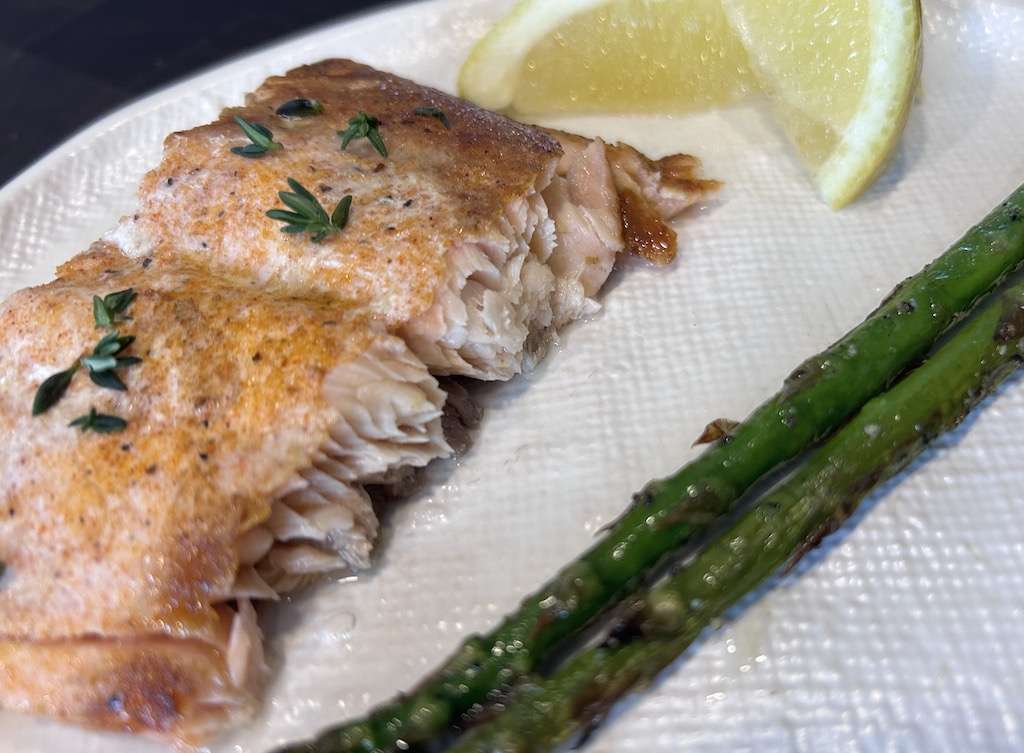
From crunchy green beans to tender broccoli, zesty artichokes to vibrant green bell peppers, I have got you covered with some of the best substitutes for asparagus. Whether you’re looking for a healthy side or a delicious main course, these alternatives will surely satisfy your taste buds.
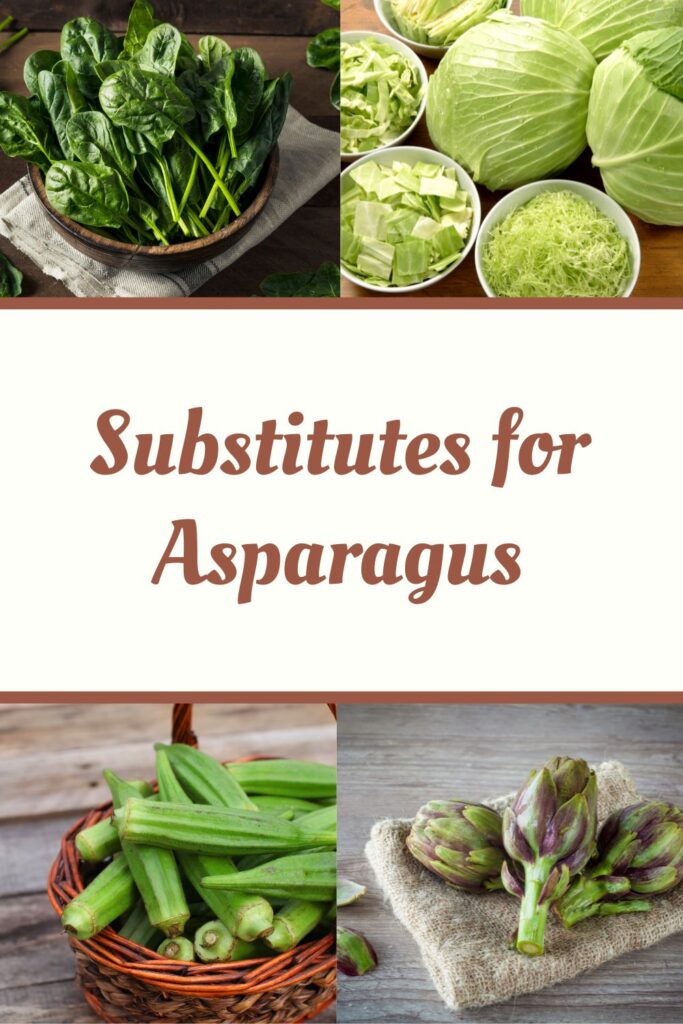
too busy to make it?
pin it for later to your favorite pinterest board
Substitutes for Asparagus
Let’s dive in and explore the world of asparagus substitutes!
1. Green Beans
You can easily swap out asparagus with green beans for a similar taste and texture. Green beans are a versatile and nutritious alternative that can be used in a variety of recipes. These crisp and crunchy vegetables have a slightly sweet and earthy flavor, making them a great substitute for asparagus.
Green beans are packed with vitamins A, C, and K, as well as fiber and antioxidants. They are also low in calories and fat, making them a healthy choice.
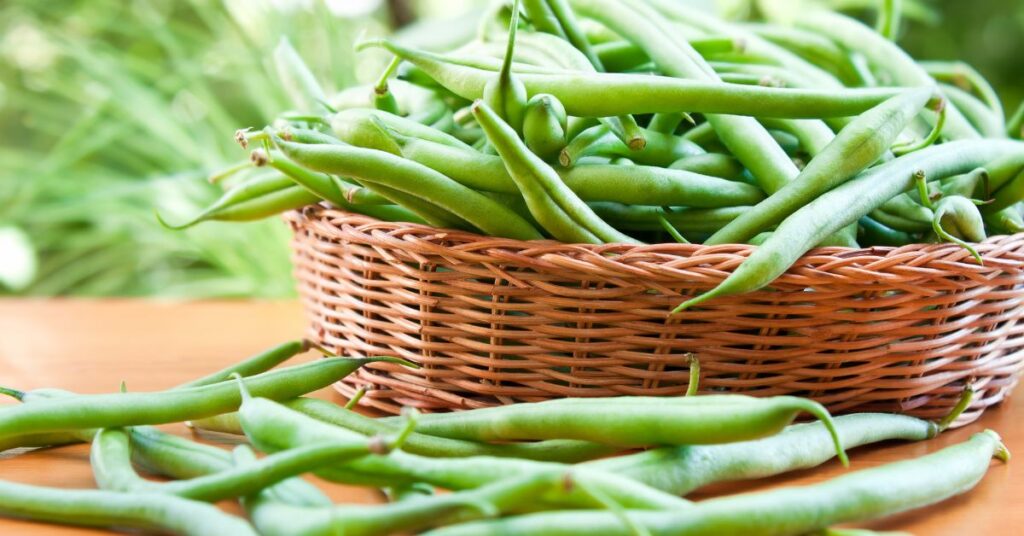
When using green beans as a substitute, you can simply trim the ends and cook them in the same way as asparagus. Whether you’re roasting, sautéing, or steaming, green beans will provide a delicious and satisfying alternative to asparagus.
2. Broccoli
If you enjoy asparagus, you might find that broccoli is a suitable alternative. Broccoli is a nutrient-rich vegetable that belongs to the same family as asparagus. It has a similar texture and a mild, slightly bitter taste that can be pleasing to your palate.
Not only is broccoli a good substitute for asparagus in terms of flavor and texture, but it also offers numerous health benefits. It’s packed with vitamins, minerals, and fiber, making it an excellent addition to any diet.
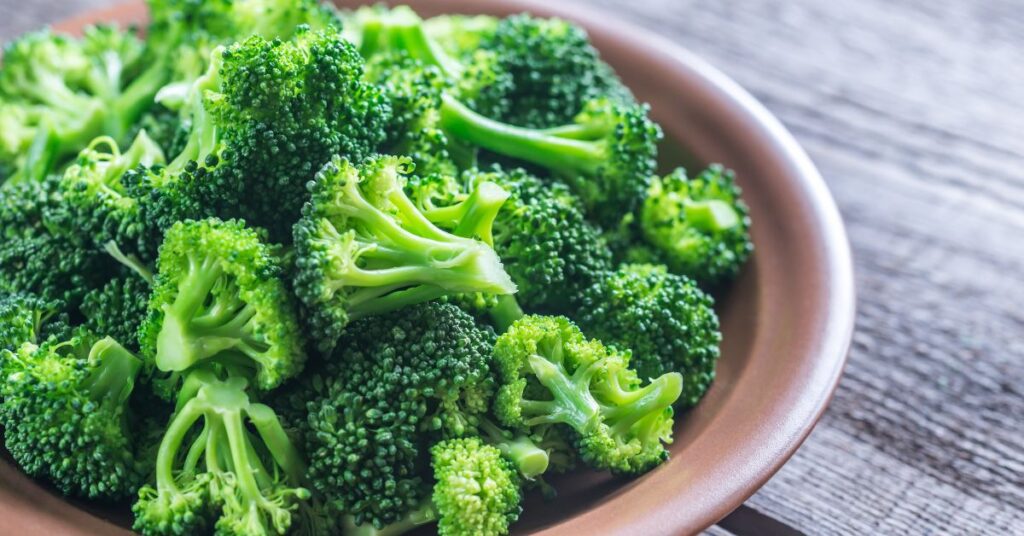
Broccoli can be steamed, sautéed, roasted, or even eaten raw in salads. So next time you’re looking for a delicious and nutritious alternative to asparagus, give broccoli a try.
3. Brussels Sprouts
Brussels sprouts are a versatile and flavorful vegetable that you can include in a variety of dishes. These mini cabbages are packed with nutrients and add a unique taste to your meals. To prepare them, you can roast, sauté, or even steam them.
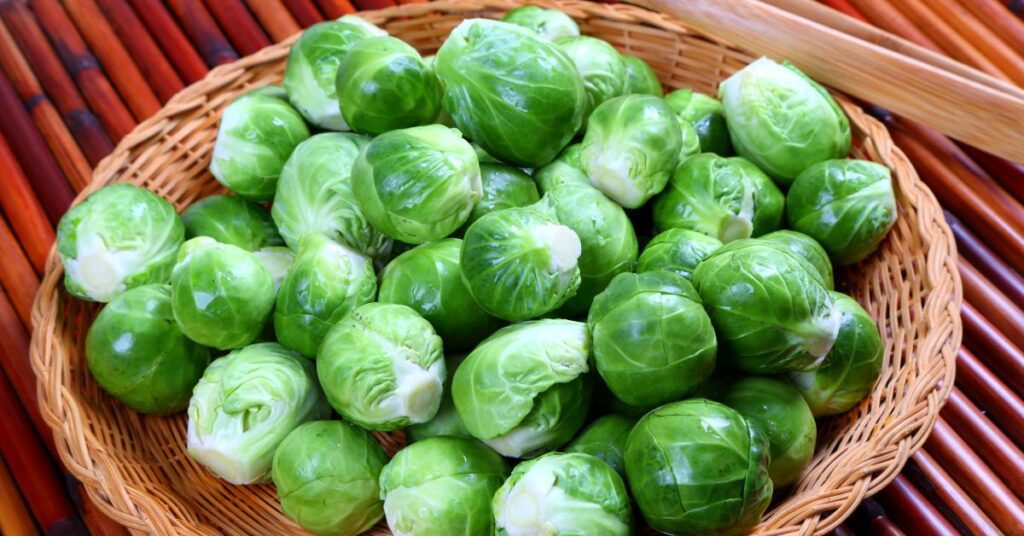
Because of their similar texture and subtle hint of bitterness, Brussels sprouts make a fantastic stand-in for asparagus. They can be used in salads, stir-fries, or as a side dish. To enhance their flavor, you can add herbs, spices, or even a drizzle of balsamic glaze.
Whether you’re looking for a new vegetable to try or need a substitute for asparagus, Brussels sprouts are a delicious and nutritious option that will elevate your culinary creations.
4. Zucchini
Zucchini is a versatile vegetable that adds a refreshing crunch to your salads and a delicious flavor to your stir-fries.
Whether you’re looking to add some variety to your meals or searching for a substitute for asparagus, zucchini is a fantastic option.
This vibrant green vegetable is packed with nutrients and can be prepared in numerous ways. You can slice it thinly and toss it into a salad. My personal favorite is to grill it to perfection for a smoky flavor.
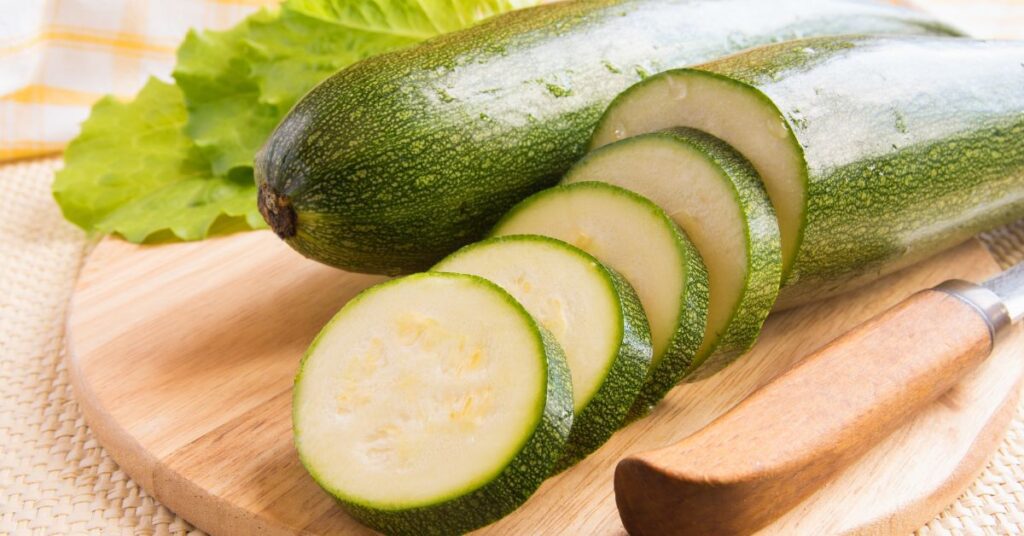
Additionally, zucchini can be spiralized to create a low-carb alternative to pasta. Its mild taste allows it to absorb the flavors of any dish it’s cooked with, making it an excellent substitute for asparagus in stir-fries or roasted vegetable medleys.
Give zucchini a try, and you won’t be disappointed!
5. Artichokes
Artichokes are a delicious addition to your meals, offering a unique texture and a subtle nutty flavor. They aren’t only tasty but also packed with nutrients. Here’s why you should consider incorporating artichokes into your diet:
- Rich in antioxidants: Artichokes contain high levels of antioxidants, which help protect your cells from damage caused by free radicals.
- Good source of fiber: With about 10 grams of fiber per medium-sized artichoke, they can aid in digestion and promote a healthy gut.
- Support liver health: Artichokes have been shown to support liver function by promoting the production of bile, which aids in the digestion and absorption of fats.
- Low in calories: If you’re watching your calorie intake, artichokes are a great option as they’re low in calories but still provide a satisfying and flavorful addition to your meals.
6. Okra
Okra is a versatile vegetable that can be enjoyed in a variety of dishes, from stews to stir-fries. If you’re looking for a substitute for asparagus, okra can be a great option. With its unique flavor and texture, it can add a delicious twist to your recipes.
Okra is known for its slimy texture, which can be off-putting for some people. However, when cooked properly, this sliminess can actually enhance the dish. To reduce the sliminess, you can try soaking the okra in vinegar or lemon juice before cooking.
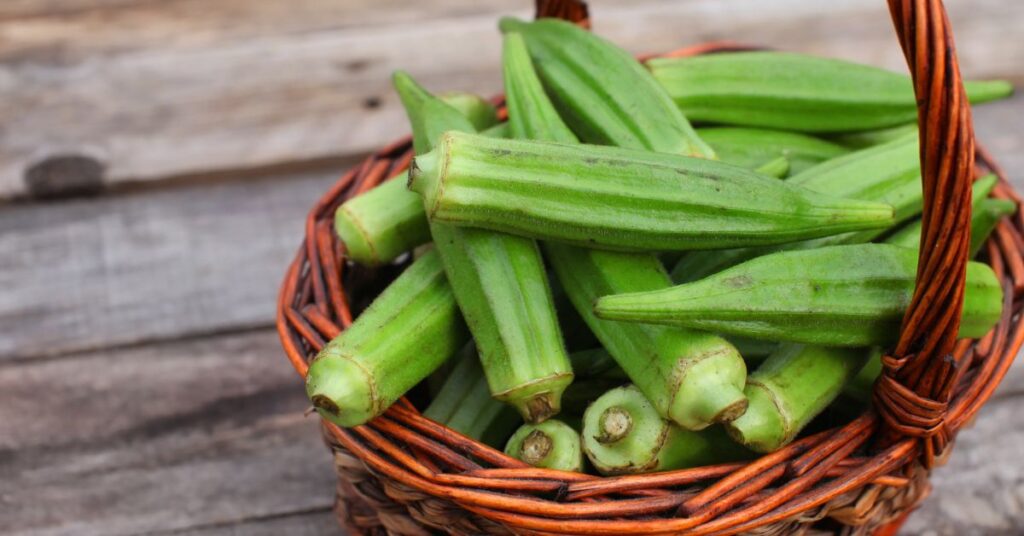
Okra is also packed with nutrients like Vitamin C, fiber, and antioxidants. So, not only does it serve as a great substitute for asparagus, but it also provides a healthy boost to your meals.
7. Green Peas
If you’re looking for a versatile vegetable to add to your meals, green peas can be a delicious and nutritious option. These vibrant little legumes aren’t only packed with flavor but also offer a range of health benefits.
Here’s why green peas are a great addition to your diet:
- Nutrient-rich: Green peas are rich in vitamins A, C, and K, as well as minerals like potassium and iron.
- Fiber boost: They’re an excellent source of dietary fiber, which aids digestion and helps maintain a healthy gut.
- Antioxidant powerhouse: Green peas contain antioxidants that help protect your body against oxidative stress and inflammation.
- Plant-based protein: With approximately 8 grams of protein per cup, green peas are a great option for those following a vegetarian or vegan diet.
8. Snow Peas
Now let’s talk about snow peas, which are another wonderful substitute for asparagus.
Snow peas, also known as Chinese pea pods, have a crisp and crunchy texture that’s similar to asparagus. These slender, flat pods are packed with flavor and bring a delightful freshness to any dish.
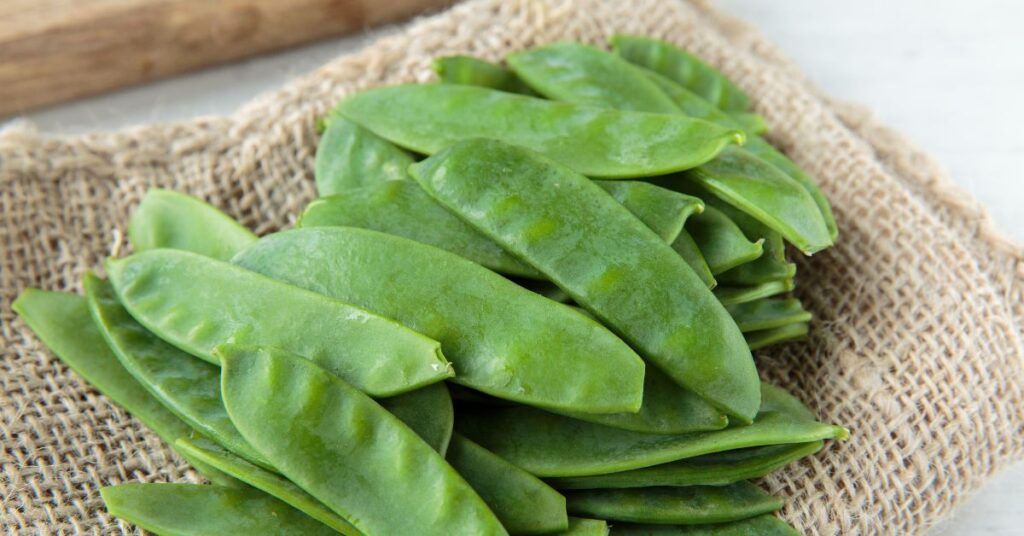
Snow peas are a versatile vegetable that can be eaten raw or cooked. They’re commonly used in stir-fries, salads, and even as a tasty snack. When cooking snow peas, make sure to keep them slightly crisp to maintain their unique texture.
Whether you’re looking for a substitute for asparagus or simply want to explore new flavors, snow peas are a fantastic choice that will add a delightful twist to your dishes.
9. Snap Peas
You’ll love the crisp and juicy texture of snap peas, which make a great addition to stir-fries and salads. These versatile vegetables not only add a pop of color to your dishes but also provide a delightful crunch. Snap peas are rich in vitamins A, C, and K, as well as fiber, making them a nutritious choice for any meal.
Here are some reasons why snap peas are one of the best substitutes for asparagus:
- Similar taste: Snap peas have a slightly sweet and fresh flavor, just like asparagus.
- Easy to prepare: Snap peas require minimal preparation, making them a convenient option for quick and delicious meals.
- Cooking versatility: Snap peas can be steamed, sautéed, roasted, or even enjoyed raw, allowing you to experiment with different cooking methods.
- Nutritional benefits: Snap peas offer a range of health benefits, including boosting immunity, improving digestion, and supporting heart health.
With their delightful taste, snap peas are an excellent substitute for asparagus in your favorite recipes. Give them a try and enjoy their vibrant flavor in your next meal!
10. Fiddlehead Ferns
Fiddlehead ferns offer a unique and earthy flavor that pairs well with a variety of dishes. These tightly coiled, vibrant green shoots are harvested in the spring and are a delicacy in many cuisines. When cooked, they have a tender texture and a flavor that’s often compared to asparagus or spinach.
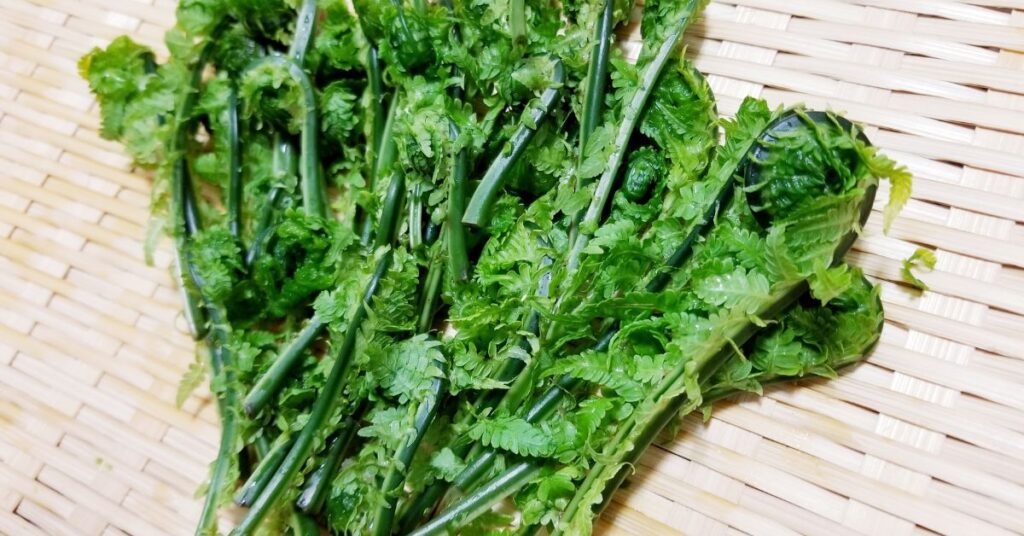
Fiddlehead ferns can be steamed, sautéed, or even pickled to enhance their taste. Their distinct flavor profile makes them a great substitute for asparagus in recipes. Whether you’re making a stir-fry, a salad, or a side dish, fiddlehead ferns can add a touch of elegance and a hint of earthiness to your meal.
11. Bok Choy
If you’re looking to add some leafy greens to your stir-fry, bok choy is a great choice. Not only is it delicious, but it also provides numerous health benefits. Here’s why you should consider adding bok choy to your next stir-fry:
- Nutrient-rich: Bok choy is packed with vitamins A, C, and K, as well as calcium and potassium.
- Cancer-fighting properties: It contains compounds that have been shown to inhibit the growth of cancer cells.
- Heart-healthy: Bok choy contains antioxidants and fiber, which can help reduce the risk of heart disease.
- Anti-inflammatory: The high levels of antioxidants in bok choy can help reduce inflammation in the body.
12. Green Bell Peppers
When it comes to adding a pop of color and flavor to your dishes, green bell peppers are a versatile choice. Not only do they bring a vibrant green hue to your plate, but they also offer a crisp texture and a slightly sweet taste.
Whether you’re sautéing them for a stir-fry, stuffing them with your favorite fillings, or slicing them up for a refreshing salad, green bell peppers are a fantastic addition to any meal.
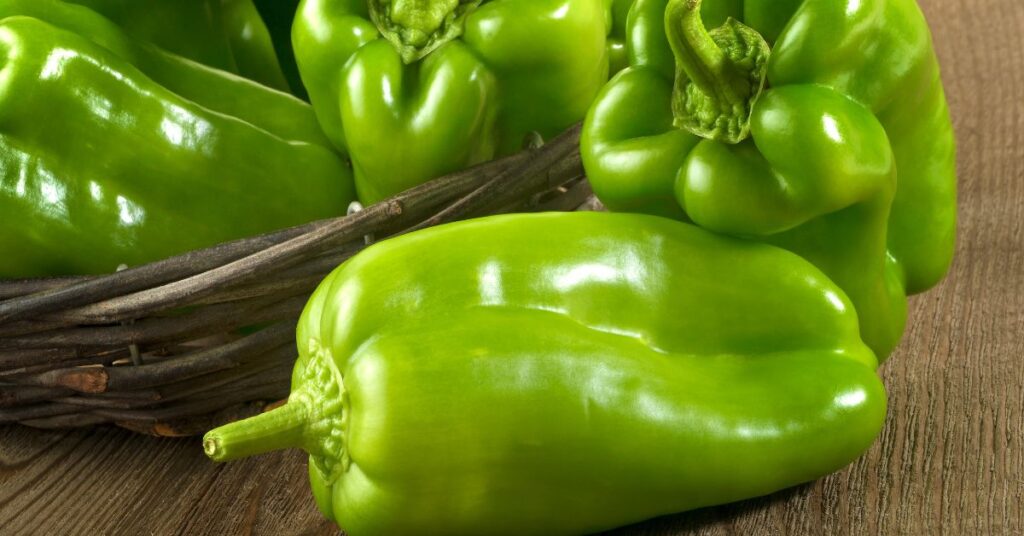
These peppers are rich in vitamins A and C, as well as antioxidants, making them a nutritious choice. They also provide a good amount of fiber, which can aid in digestion.
13. Cabbage
Cabbage is a versatile vegetable that you can enjoy raw in salads or cooked in a variety of dishes. Here are a few ways you can incorporate cabbage into your meals:
- Shredded cabbage can be used as a crunchy topping for tacos or sandwiches.
- Cabbage leaves can be used as a low-carb alternative to tortillas or wraps.
- Braised cabbage is a delicious side dish that pairs well with roasted meats.
- Cabbage can be fermented to create sauerkraut, which isn’t only tasty but also packed with probiotics.
In addition to its culinary uses, cabbage is also a nutritious vegetable. It’s low in calories and high in fiber, vitamin C, and vitamin K.
14. Spinach
Spinach is a nutrient-dense leafy green that you can enjoy in salads, smoothies, or sautéed as a side dish. Packed with vitamins A, C, K, and minerals like iron and calcium, spinach is a versatile and healthy substitute for asparagus.
Its vibrant green color indicates high levels of chlorophyll, which supports healthy digestion and detoxification. Spinach also contains antioxidants that protect your cells from damage and boost your immune system.
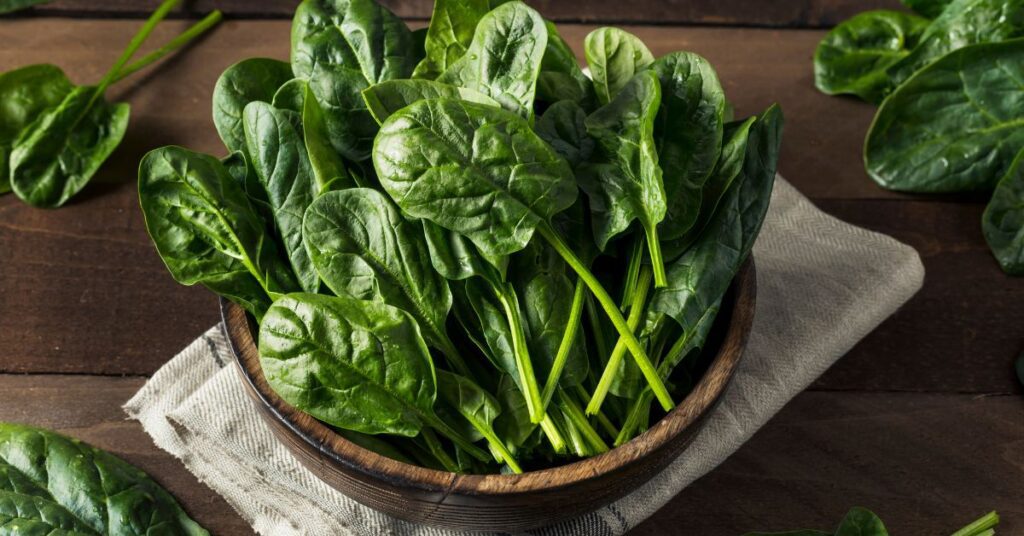
Whether you choose to have it raw or cooked, spinach provides a mild and slightly earthy flavor that pairs well with a variety of ingredients. Add it to your omelets, pasta dishes, or soups for an extra dose of nutrients, and enjoy the numerous health benefits this leafy green has to offer.
15. Kale
Kale, a popular leafy green, is a great addition to your diet due to its high levels of vitamins and minerals. It’s packed with nutrients that can benefit your overall health. Here are some reasons why kale should be on your grocery list:
- Rich in Vitamin C: Kale is a great source of Vitamin C, which can help boost your immune system and protect against common illnesses.
- High in Vitamin K: This nutrient is essential for blood clotting and bone health.
- Loaded with antioxidants: Kale contains powerful antioxidants that can help protect your cells from damage caused by free radicals.
- High in fiber: Including kale in your diet can promote healthy digestion and help prevent constipation.
Kale is a great addition to soups as it holds up well without wilting as much as spinach, which is why I love using kale in my Sausage and Lentil Soup!

Conclusion
When it comes to finding the best substitutes for asparagus, you’ve plenty of delicious options to choose from. Whether it’s the crispness of green beans, the versatility of zucchini, or the earthy flavors of broccoli and Brussels sprouts, these alternatives are sure to satisfy your palate.
Don’t be afraid to experiment with artichokes, green bell peppers, cabbage, spinach, and kale either. Remember, variety is the spice of life! So get cooking and enjoy your veggie-filled culinary adventures.





